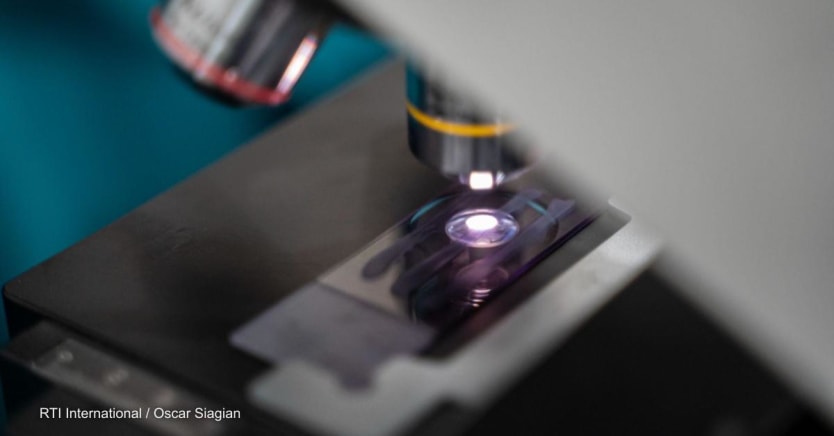
COVID-19. Mpox. Bird flu.
These infectious diseases have dominated headlines, bringing the issue of global health security to the fore. They’re a stark reminder that our global interconnectedness means that health insecurity anywhere can become a threat everywhere, including here in the United States.
But health security hinges on more than preventing pandemics. A litany of infectious diseases can come from human-animal contact — contact that is increasing as extreme weather events shift where and how humans and animals live.
One Health emerged in the 1980s as a multidisciplinary programmatic framework for addressing zoonotic diseases by balancing and improving the health of humans, animals, and ecosystems. In recent years, this integrated, unifying approach has gained new relevance.
At RTI International, we are optimistic that it can usher in not only progress on pandemic preparedness and prevention but also a wider impact on disease management and elimination. To effectively apply the One Health approach to protect against health threats, the global community must champion multisectoral, locally led solutions.
Strengthening health systems to mitigate disease threats
Preparing for the unexpected is a key refrain of health security. Yet, the global health community needs to focus on preparing for the expected, too. We must strengthen and improve health systems’ ability to handle and contain both known threats — such as rabies, Lassa, and Nipah — and novel ones, including COVID-19 and mpox Clade Ib. A One Health approach, which integrates expertise from key sectors, bolsters response coordination for unexpected health threats and can help countries better address known risks.
By leveraging a One Health approach, we have expanded who is engaged in the planning and implementation of services meant to treat and eliminate neglected tropical diseases, or NTDs — a set of 21 diseases that are most prevalent in hard-to-reach areas, such as pastoralist communities in Uganda. These communities are highly mobile and often prioritize the health of their livestock above their own.
So, RTI facilitated a partnership between local health and veterinary services to reach these communities with medicines that prevent NTD infections in people while they were getting their livestock vaccinated.
Supported by the U.S. Agency for International Development’s Act to End NTDs | East program, the government of Uganda is uniting local health and veterinary officers to find cost-effective synergies like this in the Karamoja region. Veterinary officers provide data on pastoralist movements and leverage their trusted relationships with these communities, enabling health officers to deliver NTD interventions and education more effectively. These efforts are timed with livestock vaccination and treatment campaigns for threats such as rabies, ticks, and parasites, benefiting both animal and human health.
This unique multisectoral collaboration puts Uganda one step closer to eliminating NTDs among pastoralist communities. It also has the potential to bolster health security through stronger links between local health and veterinary officers, which could translate into stronger collaboration and coordination on health threats beyond NTDs that can move from livestock to humans.
Local capacity leads the way
At the heart of the Uganda example is a focus on local leadership and capacity — elements that are critical to unlocking the full potential of a One Health approach for stronger health security.
Development practitioners and governments alike must be intentional about prioritizing local capacity strengthening and local ownership as we use One Health approaches to strategically expand who is involved in planning and implementing health interventions.
Laboratories are a great example that spans NTDs and other health threats. Strengthening local laboratory capacity is a key element of our NTD work as it can help lower the cost and increase the speed of diagnosing infections, monitoring pathogen transmission, and responding to outbreaks.

The same capacity that laboratories need to efficiently collect, process, and analyze NTD samples lends itself to monitoring other diseases — both human and animal — as well. In fact, laboratories are a critical component of health systems’ ability to detect zoonotic diseases that threaten health security.
Even after our work ends, this local capacity will remain within the countries’ health system and can be applied to disease monitoring and surveillance, preventing disease recurrence and outbreaks.
With funding from the U.S. Centers for Disease Control and Prevention and USAID, RTI has collaborated with community health workers in the Democratic Republic of Congo and Guinea to strengthen their capacity to detect health threats beyond their routine areas of focus as part of the countries’ infectious disease and surveillance response system.
These health workers are a critical part of a front-line, case- and event-based surveillance system that detects and reports signals associated with potential health threats across the human, animal, and environmental interface. Health workers report when a person becomes sick after contact with a sick person or animal, or contaminated water.
Opinion: The new normal — preparing for the next zoonotic pandemic
Zoonotic diseases are likely to rise with demand on natural resources and encroachment on habitats. More coordination across global health and conservation can help address zoonotic spillover and its effects on planetary health.
The system even accounts for natural disasters such as flooding, which can impact disease spread. In both countries, this improved information flow enables local authorities to rapidly report and verify a health event. Human and animal health authorities can then swiftly investigate to determine the cause and potential threat to the community.
In DRC and Guinea, just in the last couple of years, the system has helped detect suspected community cases of diseases such as rabies, cholera, measles, Marburg, and Ebola.
Health security on the horizon
As the risk of human and animal disease transmission increases with extreme weather events, applying a One Health approach that prioritizes local capacity strengthening will be key to ensuring health security for all, from remote communities threatened by infectious diseases to connected communities here in the U.S.
Imagine a future where countries have eliminated existing diseases while shoring up their ability to also rapidly detect, verify, and stop new ones. That future is within reach if we are intentional and willing to monitor progress. Successes in local capacity strengthening offer encouraging examples that the global community can leverage to unlock the full potential of One Health for health systems strengthening and security.
Learn more about RTI’s partnerships in global health.










